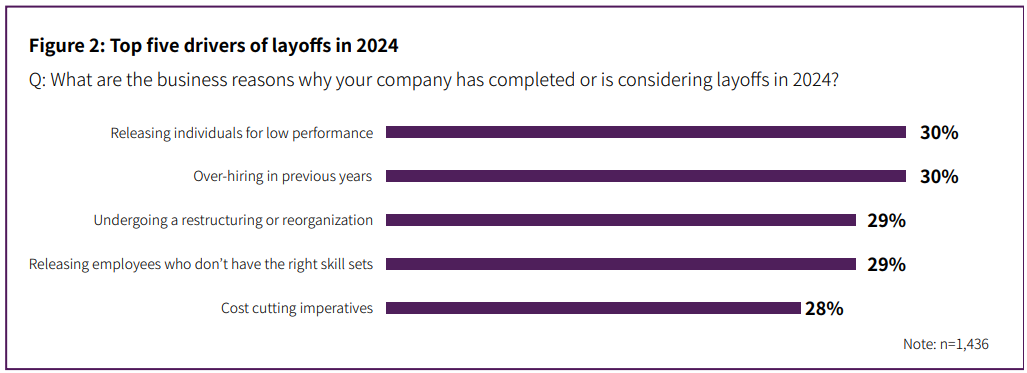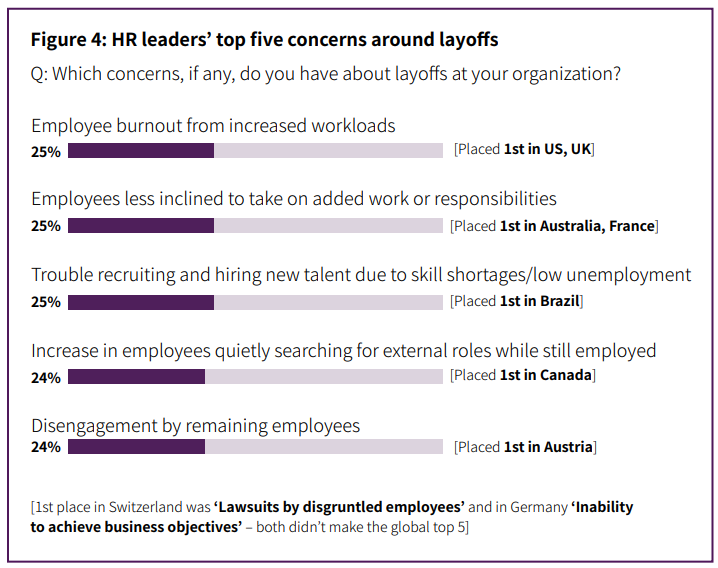Many employers considering redeploying workers

Layoffs will persist this year – but for different reasons compared to last year, according to a report.
Overall, 48 per cent of HR leaders say their organization has conducted layoffs in 2024 or is planning to do so.
Another quarter (25 per cent) are unsure about layoffs in 2024, found the survey by LHH.
This means 73 per cent of HR leaders are making or considering layoffs in 2024, slightly down from 77 per cent in 2023.
In Canada, 44 per cent have undertaken layoffs, while 19 per cent are considering it.
A number of employers have announced layoffs this year, including Canada Goose, the Body Shop, Cisco and Intel.
Reasons behind layoffs
While layoffs continue to happen, the number of employers letting workers go due to excessive hiring in the past has dropped.
Last year, 41 per cent of HR leaders said that “over-hiring in previous years” was the top reason for layoffs.
This year, low performance from workers and a skills mismatch are rising among the reasons for job cuts.

Source: LHH
"Our findings underscore that HR leaders are acutely aware of how technology is impacting the skills needed for organizational success," says Russell Williams, senior vice president of Career Transition & Mobility, North America, at LHH.
"In the face of economic challenges, employers are increasingly reassessing whether their workforces are meeting these evolving needs, while also looking at how technology can be harnessed to support their employees' growth both within the organization and as they depart."
HR leaders' concerns around layoffs
The prospect of layoffs brings about a lot of worries for workers and employers alike, according to LHH’s survey of 3,011 HR leaders and 8,101 white-collar workers across nine countries, including Canada.
Overall, more than half (56 per cent) of workers report layoffs within their teams in the last 12 months, and 36 per cent report being worried about a potential layoff by their current employer.
Meanwhile, about a quarter of employers are worried about possible employee burnout due to increased workload, possible hiring challenges and possible disengagement from workers.

Source: LHH
Employment in Canada remained largely unchanged for the third consecutive month in July, but there was a notable decline in private employment numbers, according to a Statistics Canada (StatCan) report.
What is the purpose of redeployment?
To avoid undertaking layoffs, 82 per cent of HR leaders are considering redeploying workers as a layoff alternative this year.
Overall, 47 per cent of employers are using this strategy. The number among employers in Canada is 38 per cent.
And this seems to be a win-win situation, as many workers seem to be eager to make a career move.

Source: LHH
"The global job market has undergone significant reshaping over the past year, largely due to the rising impact and integration of AI," said John Morgan, President of LHH's Career Transition & Mobility and Leadership Development businesses.
"As the workforce adapts to this new reality, our research tells us that leaders are recognizing the need to evolve talent strategies to support employees throughout their careers, making reskilling and redeployment essential for maintaining an agile organization. Technology has significantly enhanced career phases like outplacement, enabling us to quickly identify and develop in-demand skills for transitioning workers. Once the awareness gap for this support is bridged, both employers and employees will be equipped to navigate the future with greater confidence and strength."
Overall, 90 per cent of employers say that adapting to technological change is a moderate to high priority. Nearly half (48 per cent) feel their employees are barely or not at all prepared to use artificial intelligence or Generative AI, according to a previous Deloitte report.




